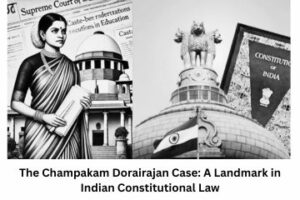Written By: Kanishka Sharma
Divorce and Gender Justice
Divorce which is also known as dissolution of marriage is the process of terminating a marriage. It usually says the canceling or reorganizing of the legal duties and responsibilities of marriage, thus dissolving the bonds of matrimony between a married couple under the rule of law of the particular country or state. Gender Justice means ending the inequalities between men and women that are reproduced and produced in the family, market, the community, and the state. It requires all the issues for tackling the injustice and discrimination towards women and the poor.
What is a divorce in Hindu Marriage Act?
The provisions related to Divorce in Hindu were Introduced by the Hindu Marriage Act,1955and it defines divorce as the dissolution of marriage. For every couple’s happiness and betterment, Their relationship or marriage needs to be surrounded by safeguard which is highly specified by law. It involves the theories of divorce such as mutual consent, fault theory, and irretrievable breakdown.
It is said in the Hindu Marriage Act, where the spouse can get a divorce or appeal for the dissolution of marriage in a court of law. The Hindu Marriage Act is based on the fault theory in which any one of the aggrieved spouses (Section 13(1)) can approach the court of law and seek the remedy of divorce. Section 13(2) provides the grounds on which only the wife can approach the court of law and seek the remedy of divorce.
Gender Justice under Hindu Succession Act
Section 6 of the Act creates an equal position for women by providing the right of coparcener in which a daughter of the Hindu joint family is considered as a coparcener, and they are entitled to all the rights and liabilities as a son. Now at present, a woman has equal rights as men in the property of a Hindu joint family.
Divorce in Muslim law
It was the Dissolution of Muslim Marriage Act of 1939 which gave the right to Muslim women to ask their husbands for dissolution of their marriage before that there was no piece of legislation under which a Muslim woman could ask for the dissolution of her marriage.
‘The Dissolution of Muslim Marriage Act of 1939 laid down nine grounds under which a Muslim woman could seek divorce within the court namely: 1) that the whereabouts of the husband hasn’t been known for a period of 4 years, 2) that the husband has neglected or did not provide her maintenance for a period of two years, 3) that the husband has been sentenced to imprisonment for a period of seven years or upwards 4) that the husband did not perform, without reasonable cause, his marital obligations for a period of three years, 5) that the husband was impotent at the time of the marriage and continues to be so 6) that the husband has been insane for a period of two years or is suffering from leprosy or a virulent venereal disease, 7) that she, having been given in marriage by her father or other guardians before she attained the age of fifteen years, repudiated the marriage before attaining the age of eighteen years”
Gender Justice in Muslim law
Muslim personal law is perceived with further gender inequality. This makes justice to Muslims something extraordinary. They are not left alone to determine how ‘justice’, ‘fairness’ and ‘equity’ are achieved. There are various instances where God stipulates what is ‘just’ for human society and human beings have no option but to observe such divine stipulations or decrees.
God commands human beings to be steadfast in the establishment of justice and fairness on earth and made it a virtuous act that would guarantee them peace and tranquillity in this world and eternal bliss in the Hereafter. Those who tread the path of injustice are promised damnation. Justice is enjoined in all aspects of life be it a business transaction, politics, marital life, administration of justice, intellectual and educational pursuits, etc.
Conclusion
Divorce is the separation of two couples somewhere it makes them happy and somewhere it frees them from a relationship not only do they get freedom from a relationship but also they get free from the duties and responsibilities they have for each other. In India, Divorce is always known as a bad term as a couple is not only separating their families also get separated. Gender justice is a human right where it says that every girl and woman has the right to live with freedom and dignity and to live without any fear. It is very important for human progress by supporting them in every field, paying them an equal salary, knowing their point, and helping them gain power.
Previous Posts
Right to information in India: A legal analysis
Sui Generis Protection of Traditional Knowledge
Keywords
Divorce, Gender Justice, Divorce and Gender Justice,




